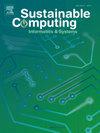奖牌:5G车辆网络中节能路由的可持续人工智能框架
IF 5.7
3区 计算机科学
Q1 COMPUTER SCIENCE, HARDWARE & ARCHITECTURE
引用次数: 0
摘要
智能交通系统需要在支持5g的车辆自组织网络(VANETs)中同时优化性能和环境影响的路由协议。现有的解决方案往往将可持续性视为次要制约因素,这限制了它们在解决气候变化目标方面的有效性。本研究提出了奖牌(元启发式增强型深度适应学习系统),这是一个混合框架,将深度强化学习与元启发式优化相结合,以实现卓越的性能和环境可持续性。该系统引入了绿色绩效指数(GPI),这是首个综合能源效率、碳足迹、延迟和可靠性的指标。通过使用行业标准模拟器进行广泛评估,奖牌显示了统计上显着的改进:奖牌实现了96.8% %的能源效率(+11.6 %),0.73 毫秒的延迟(-91.6 %),99.7 %的可靠性,以及42.3 %的碳减排,同时扩展到1000辆 + 车辆,具有线性计算复杂性。这将使其能够在智慧城市中实际实施,并实现可持续发展目标。在网络规模处理方面,这种3.3倍的复杂度提升归功于框架的混合智能架构、智能融合机制中具有双元启发式优化的自适应深度强化学习以及经验量化的O(N log N)复杂度。本文章由计算机程序翻译,如有差异,请以英文原文为准。
MEDALS: A sustainable AI framework for energy-efficient routing in 5G vehicular networks
Intelligent transportation systems require routing protocols that optimize both performance and environmental impact simultaneously in 5G-enabled Vehicular Ad Hoc Networks (VANETs). Existing solutions often treat sustainability as a secondary constraint, which limits their effectiveness in addressing climate change goals. This study presents MEDALS (Metaheuristic-Enhanced Deep Adaptive Learning System), a hybrid framework that integrates deep reinforcement learning with metaheuristic optimization to achieve both superior performance and environmental sustainability. The system introduces the Green Performance Index (GPI), the first comprehensive metric combining energy efficiency, carbon footprint, latency, and reliability. Through extensive evaluation using industry-standard simulators, MEDALS demonstrates statistically significant improvements: MEDALS achieves 96.8 % energy efficiency (+11.6 %), 0.73 ms latency (-91.6 %), 99.7 % reliability, and 42.3 % carbon reduction while scaling to 1000 + vehicles with linear computational complexity. This will allow its practical implementation in smart cities and towards fulfillment of the sustainable development goals. This complexity augmentation of 3.3x times in the network size handling is attributed to the hybrid intelligence architecture of the framework, the adaptive deep reinforcement learning with the dual metaheuristic optimisation in intelligent fusion mechanism, and the empirically quantified O(N log N) complexity.
求助全文
通过发布文献求助,成功后即可免费获取论文全文。
去求助
来源期刊

Sustainable Computing-Informatics & Systems
COMPUTER SCIENCE, HARDWARE & ARCHITECTUREC-COMPUTER SCIENCE, INFORMATION SYSTEMS
CiteScore
10.70
自引率
4.40%
发文量
142
期刊介绍:
Sustainable computing is a rapidly expanding research area spanning the fields of computer science and engineering, electrical engineering as well as other engineering disciplines. The aim of Sustainable Computing: Informatics and Systems (SUSCOM) is to publish the myriad research findings related to energy-aware and thermal-aware management of computing resource. Equally important is a spectrum of related research issues such as applications of computing that can have ecological and societal impacts. SUSCOM publishes original and timely research papers and survey articles in current areas of power, energy, temperature, and environment related research areas of current importance to readers. SUSCOM has an editorial board comprising prominent researchers from around the world and selects competitively evaluated peer-reviewed papers.
 求助内容:
求助内容: 应助结果提醒方式:
应助结果提醒方式:


